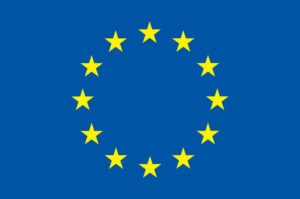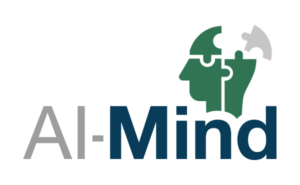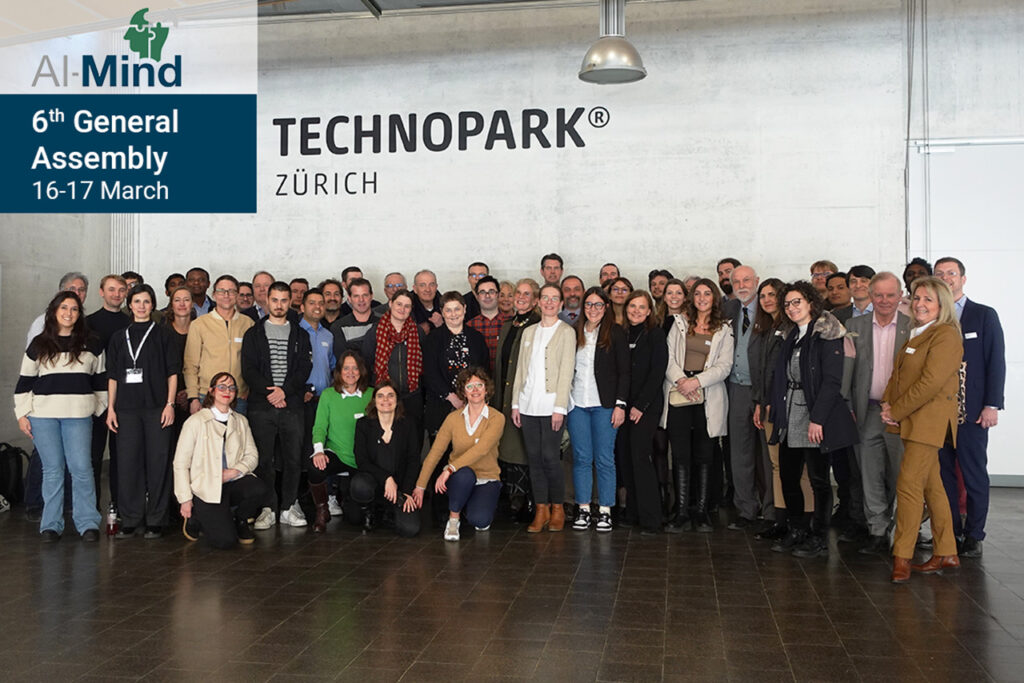The AI-Mind reports on the 6th General Assembly in Zurich
Organisations and individuals around the world are helping to raise public awareness of the challenge of neurological diseases and the importance of brain research during Brain Awareness Week in March. AI-Mind, an EU-funded research and innovation project, is committed to tackling the challenge of dementia. Not coincidentally, the 6th AI-Mind General Assembly (GA) took place on 16-17 March. Experts from the fields of brain research, artificial intelligence, ethics and clinicians are joining forces to develop AI-based tools for the screening of brain connectivity and the estimation of the risk of developing dementia.
The event was held in a hybrid format and brought together more than 50 on-site participants coming from eight European countries to Zurich, Switzerland and around 20 attendees joining remotely. The meeting agenda included over 15 multidisciplinary presentations by AI-Mind experts, two external talks and cross-work package (WP) meetings, making it not only exciting but also a success story in cross-disciplinary collaboration.
THE FIRST DAY OF THE 6TH #AIMINDGA
Dr Jeanette Müller, CEO of accelopment Schweiz AG (accelCH), kicked off the meeting with a warm welcome to all AI-Mind partners attending the assembly and shared impressions on what to expect during their short visit to Zurich, Switzerland. After a brief introduction, the project coordinator, Dr Ira Haraldsen from Oslo University Hospital (OUS) opened the official part of the meeting with her presentation on the project overview, highlighting the progress made by the consortium:

Dr Ira Haraldsen
I am honoured to coordinate the AI-Mind project with so many fine researchers and experts involved. I cannot express my pride enough to highlight the continuous progress of our work as a consortium and the achievements of the last four months that passed since we last met in Madrid. – highlights Ira
Following Dr Haraldsen’s presentation, Dr Ainar Drews presented the current state of play of the technical development at AI-Mind, such as the AI-Mind platform development and the development of the AI tools. He also presented his current communication- and work- processes as he coordinates the different developers, researchers, and clinicians involved in this technical part. As he also oversees the information exchange between AI-Mind and the two EU projects, eBRAIN-Health and EBRAINS HDC, he updated on AI-Mind’s collaboration in this area. Additionally, Ainar provided a brief introduction to transfer learning, a technique used in deep learning (DL) that allows AI models to apply knowledge gained from solving one task to solving a related task, with relatively little additional training.

Dr Ainar Drews
The basic idea of transfer learning in machine learning is just, ‘you train something on one task, and you want to reuse some of your work for another task’, like a toddler learning how to crawl sort of has an idea about gravity – and it’s going to be easier to learn how to walk after that.– explains Ainar
The morning session included also two lectures. First, Dr Stéphane Epelbaum, a representative from Eli Lilly, discussed Eli Lilly’s neurodegeneration portfolio. Following this, Dr Tita Alissa Bach and Dr Harry Hallock from DNV presented the results of the systematic literature review of user trust in AI-enabled systems.

Dr Harry Hallock

Prof. Pedro Lind

Christoffer Hatlestad-Hall
The second part of the first day focused on topics related to strategies of AI modelling for AI-Mind tools, AI-Mind Connector and AI-Mind Predictor, concepts of deep learning architecture, explainable AI and more. The presentations related to the WP3 – AI-modelling of the AI-Mind Connector & Predictor were delivered by Prof. Pedro Lind and Rabindra Khadka from Oslo Metropolitan University (OsloMET), Mateo Rueda from AALTO University (AALTO) and Christoffer Hatlestad-Hall (OUS).
A series of presentations on the WP2 – Data Management and Feature Extraction and WP4 – Data Analysis and Interactive Visualisation Platform, were given by Dr Ricardo Bruña from The Complutense University Of Madrid (UCM), Shrikanth Kulashekhar from Helsinki University Hospital (HUS), Victor Ayllón and Dr Luis Peña from Lurtis Rules S.L. and Jorge Acosta from The Universidad Politécnicade Madrid (UPM). The partners covered a range of topics, including data extraction, transformation and loading (ETL) – the process in charge of generating clean, useful data from EEG recordings performed in the AI-Mind study. Participants also got an overview of different data and input collection tools and visualisation tools as well as got a better understanding of challenges related to the development of these.
Throughout the day, the AI-Mind partners engaged in panel discussions. The meeting indeed offered a forum for fruitful exchanges to all participants who posed questions and delved deeper into the topics.
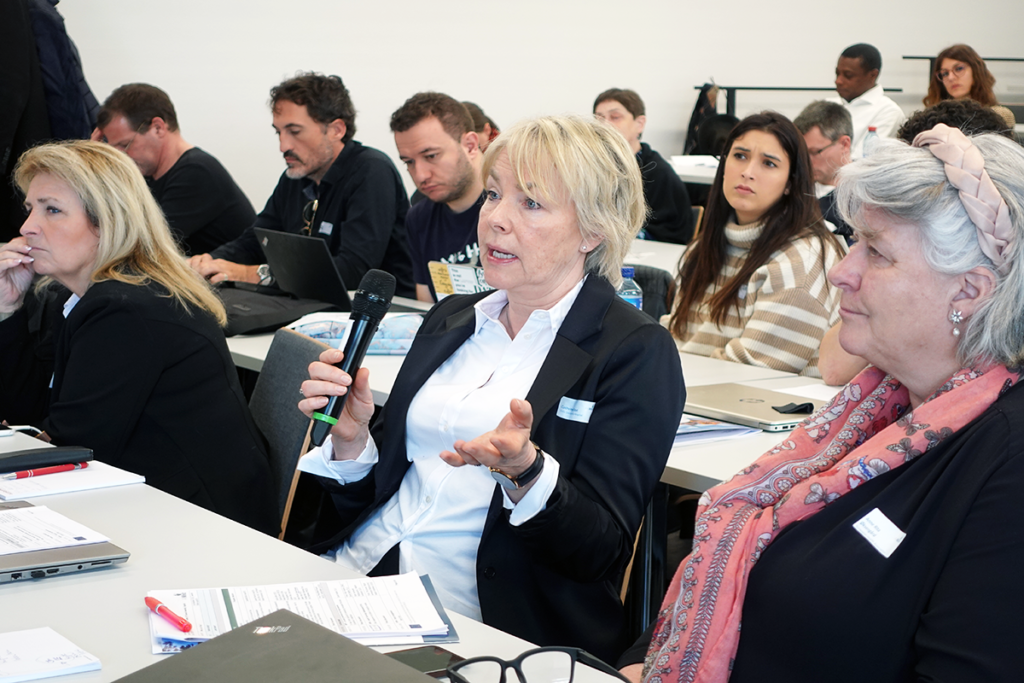
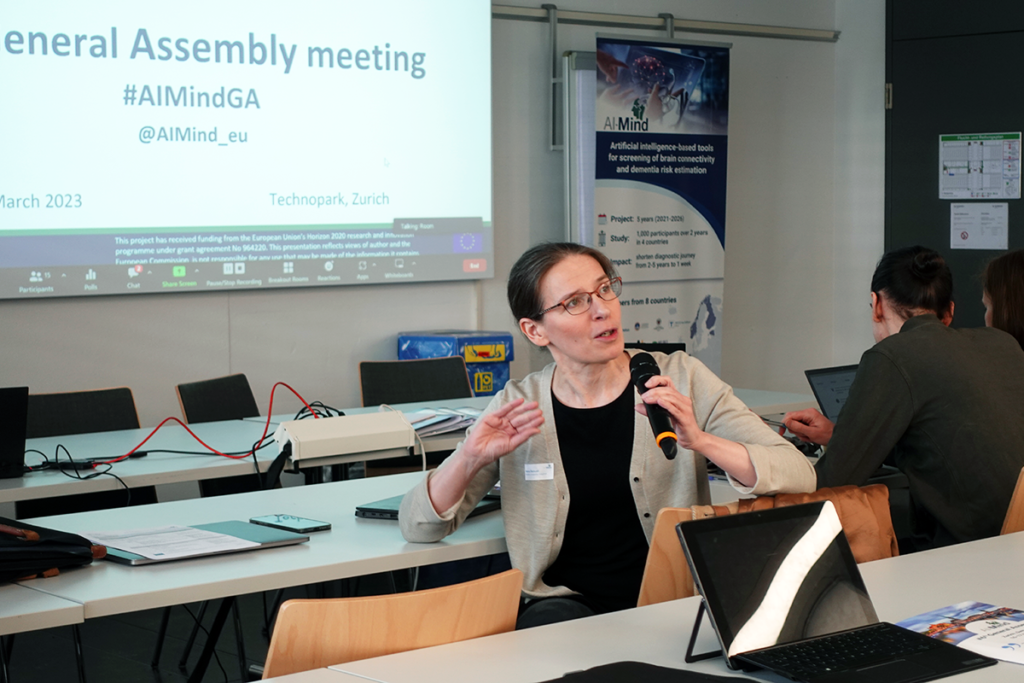
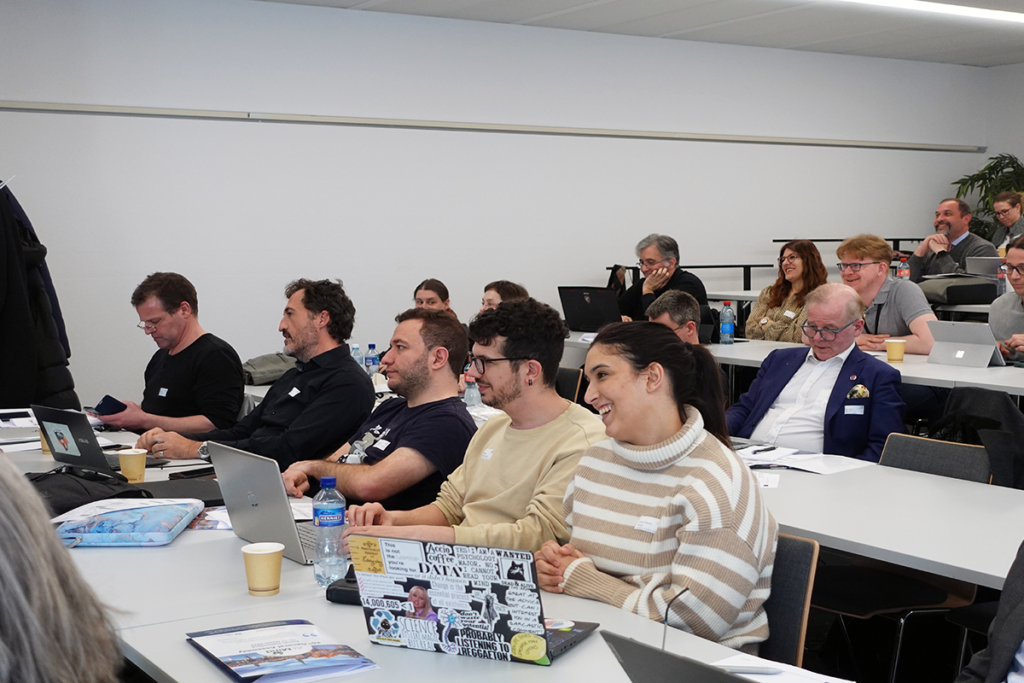
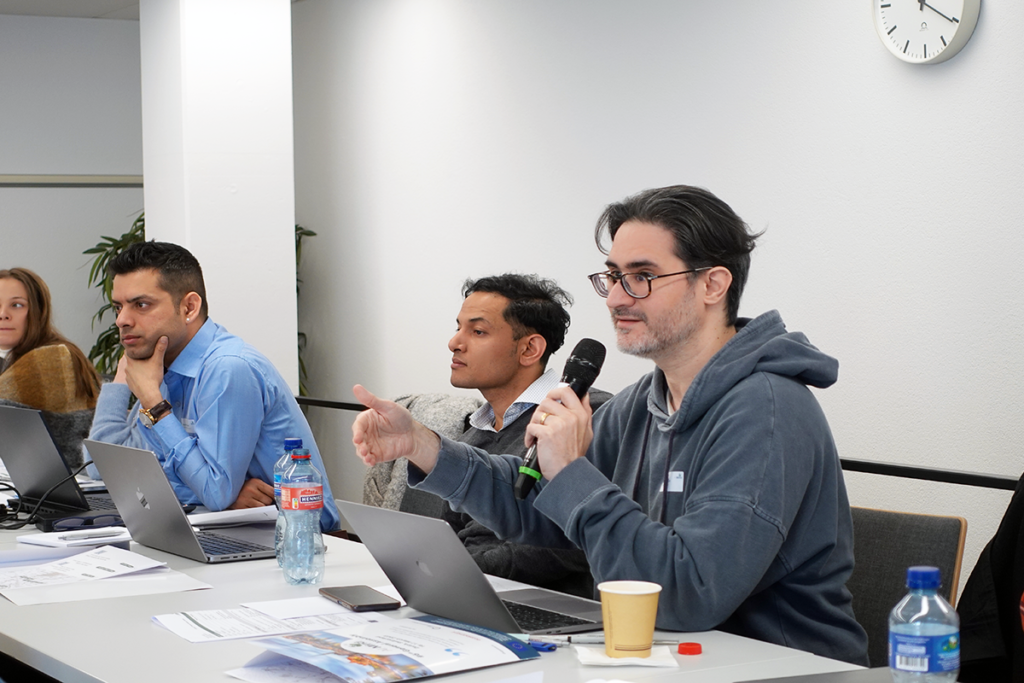
THE SECOND DAY OF THE 6TH #AIMINDGA
The second day of #AIMindGA started with an overview of project communication and dissemination (WP7), led by accelCH and presented by Joanna Plesniak (accelCH). The Alzheimer Europe Annual Conference and an opportunity to showcase the work of the AI-Mind partners were the focus of the session, moderated by both Joanna and Dr Cindy Birck from Alzheimer Europe. #AI-Mind GA attendees were further engaged in discussion with the following presentation on AI-Mind Knowledge Hub, delivered by Lina Plataniti and Vebjørn Andersson (OUS).

Joanna Plesniak
This was followed by a series of presentations by partners from clinical sites in Norway, Italy, Finland and Spain on the clinical implementation of the AI-Mind study within the work of WP5. The session began with an update on recruitment progress and harmonisation procedures.

Prof. Camillo Marra

Soraya Alfonsín Romero

Prof. Paolo Maria Rossini
To date, more than 750 out of 1,000 study participants have been recruited from five clinical sites. Representatives from OUS, the Scientific Institute for Research, Hospitalisation and Healthcare (IRCCS), Università Cattolica Del Sacro Cuore (UCSC), HUS and UCM talked about their recruitment strategies, visits of participants, screening procedures, blood sample collection and follow-up activities. A panel discussion led by Prof. Paolo Maria Rossini and Prof. Camillo Marra focused on the potential risks affecting the successful continuation of the study and the importance of providing informative communication to study participants. In addition, Prof. Dr Andreas Keller (Saarland University), an expert on the AI-Mind advisory board, provided valuable comments on the consortium’s work in WP5.
After a short break, Daniel Irabien from Tallinn University (TLU) presented a user-centred approach to developing innovative practices and guidelines in healthcare, followed by a panel discussion which also included Dr Harry Hallock (DNV). The meeting then focused on Health Technology Assessment (HTA), with Robin Vermeulen from The Radboud University Medical Center (Radboudumc) and Vebjørn Andersson (OUS) presenting on Bias Assessment and pitfalls of prediction models. A lively discussion on methods and factors influencing the assessment followed the presentation. The presentation was followed by a lively discussion on methods and factors of influence in bias assessment. The topic of trust in AI and health technology innovations was raised throughout the discussions, which only underlined the importance of the different ethical aspects that need to be addressed and are currently being considered by the AI-Mind consortium.

Daniel Irabien
One of the big challenges of novel technologies is adoption. Sometimes it is an amazing tool and yet people do not use it. First, we must understand the users’ needs and here the user-centric design is a powerful methodology. With it, we can bring the understanding of the user into the equation. – says Daniel.
The session on project coordination and innovation management (WP8) concluded the morning of the second day of the General Assembly. Andreia Cruz and Dr Müller (accelCH) presented in an engaging way the current status of the delivered reports, discussed the activities for the coming months and introduced the partners to the outcomes of the latest work of WP8 delivered in the “Intermediary Innovation Report 1” coordinated by Michael Hönger (accelCH).
After the lunch break, participants engaged in parallel sessions, including the PhD Club and cross-WP discussions. During the cross-WP meetings, partners gathered in smaller groups to deepen the topics raised during the panel discussions including technical aspects of the developed algorithms, data collection procedures and challenges to data collection within the study. The PhD Club meeting, on the other hand, focused on communication activities, opportunities to disseminate research results and ways to foster stronger collaboration between early-stage researchers of different scientific backgrounds.
Dr Ira Haraldsen (OUS) closed the afternoon session by sharing positive feedback from the Scientific Advisory Board (SAB), whose members praised the motivation of the AI-Mind partners and the quality of the data collected. Ira then went on to give a summary of the points that had been discussed over the two days and an outlook for the coming months before the next General Assembly will take place.
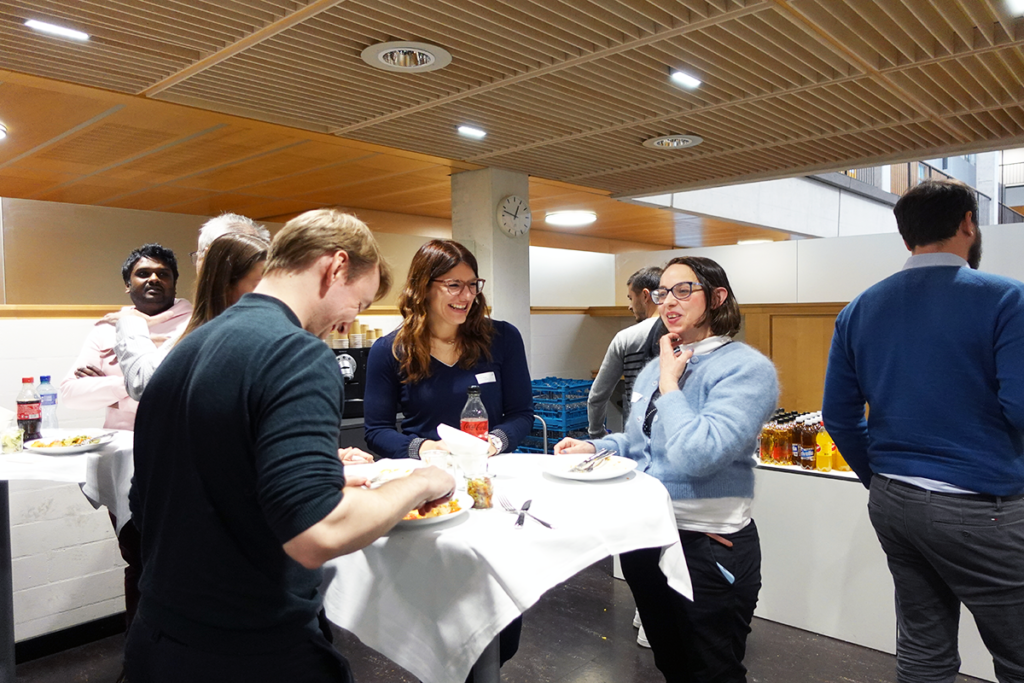
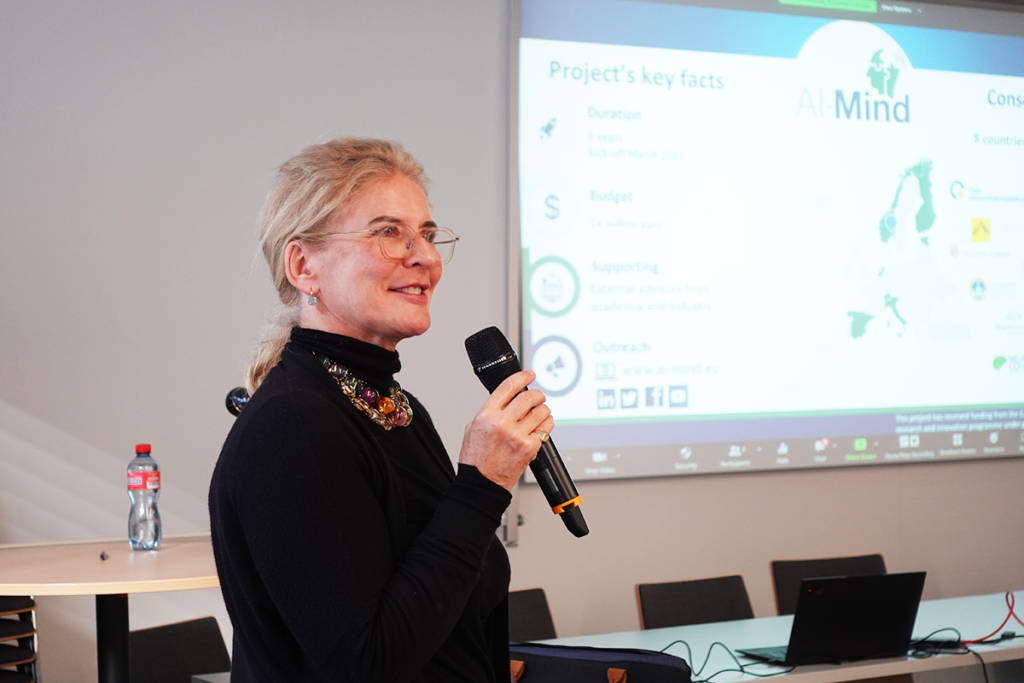
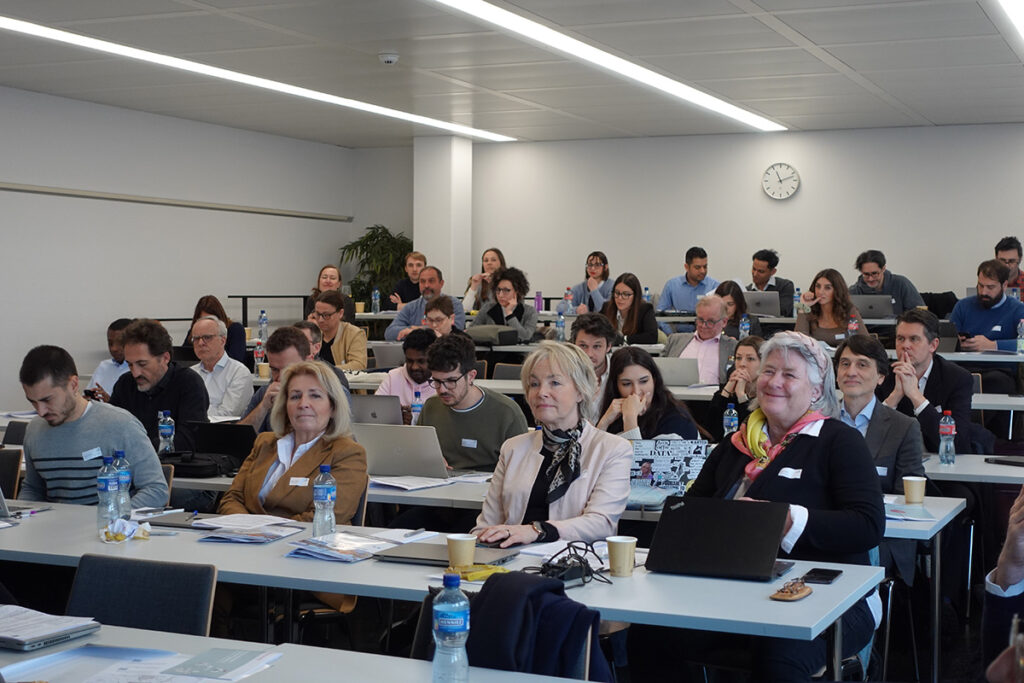
Read more about AI-Mind on our projects overview page ai-mind.eu/project/ and stay tuned for news on our most recent activities also via social media:
